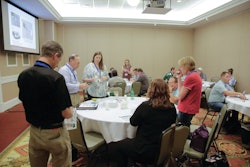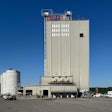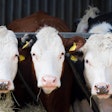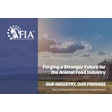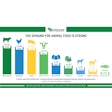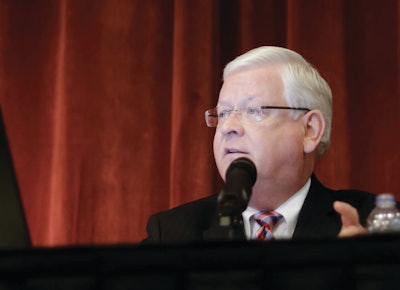
In 1974 Richard Sellers, senior vice president of public policy and education for the American Feed Industry Association, took a trip that would change the direction of his life and have an oversized impact on the feed manufacturing industry. Sellers had just finished a Bachelor of Science in vertebrate zoology and was taking a biochemistry course when he when he got an offer to go to Nepal with the Peace Corps.
“I left to go to Nepal to teach vocational agriculture, not having grown up in an agriculture family,” Sellers says. “It’s a developing country with fairly primitive agriculture, so we were teaching them basic agriculture techniques. We had a small laying hen farm, but there were no feed dealers, so we had to make feed. That was kind of my first foray into the feed industry, and I’ll use the term lightly.”

In 1985, after his wife took a job at Texas A&M University, Sellers landed his first regulatory job with the office of the Texas State Chemist, staying there for the next six and a half years. In 1991 Sellers accepted a position at AFIA, and over the next 27 years, he became an authority in the industry.
“I never really had a job in the feed manufacturing industry, I did feed and feed formulation in Nepal, got a degree and went right into regulatory work,” Sellers explains. “Then, the newly-named President Dave Bossman hired me to work at the AFIA. I was his first new hire after he took over for Oakley Ray, who had been here for 36 years. I replaced Lee Boyd who’d been here for 32 years People come and stay at the AFIA most of the time.”
Sellers is getting ready to put his jersey in the rafters and embark on the next chapter of his life. After 34 years working on feed regulation, Sellers will retire at the end of December this year, marking the end of an era. He has had a long history in the industry and sat down to talk with Feed & Grain about his career, how the industry has changed, the future of the industry, and his plans for the next phase of his life.
Feed & Grain: What have been the most significant changes you’ve seen in the industry?
Richard Sellers: There has been an enormous amount of consolidation over the years. In our office, we have one photo of our 75th anniversary with all the logos of the member companies at the time. It’s surprising how many of those companies aren’t there anymore. Eventually, we thought there would only be too big co-ops — one in the east and one on the west. The two co-ops we thought would be left no longer exist in the feed world.
I also notice people jumping around in the industry much more than in the past. Now it’s not uncommon to see people move back and forth between industries and many don’t stay in feed. Now 20 years is a long time to stay at a company — 27 is unheard of these days.
F&G: What has changed about working in regulatory since you started at AFIA?
Sellers: Computerization. Not only has it had a huge impact on the industry, but also in the way regulatory people do business. I used to come in every day and read the Federal Register, which took two weeks from the day it was published to get to me, then sit down and fax people notes. I always had stacks of things to read and letters to write. After I was done writing my messages, I would go to the mailroom, print them off, fold them up and mail them out to everybody — it was a slow and tedious process.
Now everything is instantaneous. Even on the U.S. House of Representatives floor when a bill is being debated, when we get requests for comments, we can send them back immediately, and members of Congress will read them on the House floor.
F&G: Who will be taking over your position once you retire?
Sellers: One of the best things I have done in this job is hiring Leah Wilkinson, who’s going to take my place. She came from a large pork operation in Fairmont, MN, worked for a couple of producer groups in town and has caught on very quickly. She’s going to do well in this job and has got more strength and stamina than I do.
I think AFIA is going to have a great future. There are some talented new employees, and I’ve hammered into them the science stuff that’s happening.
F&G: What is the one moment in your career that you are most proud of?
Sellers: The Animal Drug Availability Act, which took us three years, and became a bittersweet law. It lessened the requirements, without lessening the safety, of getting drugs approved. It also gave us medicated feed licenses. Before, you had to apply for each drug you wanted to use to get approval. It took a long time, and there were thousands upon thousands of these applications. Now if you want to use a particular drug, you file a facility application (also known as a “medicated feed mill license”), and you can use any that are currently approved. It was a major change for the industry.
However, it also gave us the veterinary feed directive and even though the Food and Drug Administration says they would never go retroactive on any drugs that were already approved, they just did a year or so ago.
F&G: What will you miss most about the industry?
Sellers: Honestly I’ll miss the people. When you visit companies, they roll out the red carpet for you, put your name on the front sign board and take you to nice places to eat. Yet, we’re owned by them; our members appreciate the AFIA staff and what we do.
I’ll also certainly miss working with the staff. When you’ve only got 21 people on a staff, it becomes a family. I won’t miss the traffic; I won’t miss arguing with people in Congress that don’t know our industry, and I won’t miss deadlines. However, every once in a while I sit in a Monday morning staff meeting and think, “Yeah, you know, I’m really going to miss these people.”
F&G: What are you looking forward to in retirement?
Sellers: Joel Newman gave me some excellent advice. He said, “You know, you’re going to get offers for jobs, but by gosh,” and I’m taking this to heart, “don’t take them — when you retire, just retire.”
I don’t want to be at an 8-to-5 job when I’ve retired. I’ve got a five-year-old grandson who lives near me, we’re expecting a granddaughter soon, my mother turns 90 in October, and both of our kids live in the same area — it’s time to do family.
I also have a long honey-do list and hobbies I like to do. I like to work in food security and help feed kids and raise money for what Farming to Feed the Future does weekend backpack programs for schools. There’s a school down the street from us with 650 kids, and 70% of them are on a reduced or free school lunch. So, I’m going help more with that if they want me to.
The governor also appointed me to the Virginia Board of Agriculture and Consumer Services, and that term runs through June 30, 2021. Then I can be appointed for another three years if I wanted. It’s mostly farmers and ranchers, except for me, and I’m a regulation rule writer/reader.
I’ve had a lot of really, really good experiences in the feed industry, and I’ll miss doing this, but I’ll stay involved at some level. At what level, I’m not sure yet. However, my time in the industry has been a wonderful run. ❚
.jpg?auto=format%2Ccompress&crop=faces&fit=crop&h=48&q=70&w=48)




